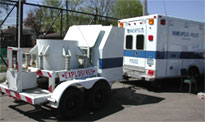 If you have sustained an injury in the line of duty, you may be entitled to hundreds of thousands of dollars-worth of benefits. There are several types of benefits available to Minnesota’s first responders who have been injured in the line of duty, depending on the individual circumstances of the case. It can be complicated to coordinate all the different types of benefits to ensure you are maximizing your financial recovery. Working with an attorney who is experienced in this area of the law is in your best interest.
If you have sustained an injury in the line of duty, you may be entitled to hundreds of thousands of dollars-worth of benefits. There are several types of benefits available to Minnesota’s first responders who have been injured in the line of duty, depending on the individual circumstances of the case. It can be complicated to coordinate all the different types of benefits to ensure you are maximizing your financial recovery. Working with an attorney who is experienced in this area of the law is in your best interest.
Types of Benefits Available for Injured Peace Officers:
Workers’ Compensation: Under the Minnesota Workers’ Compensation Act, injured police officers may be entitled to medical, vocational, and wage loss benefits. These benefits include, but are not limited to, temporary total disability, temporary partial disability, permanent total disability, permanent partial disability, vocational rehabilitation services, and retraining benefits. Wage loss benefits are based on the officer’s earnings 26 weeks before the date of injury, from all sources of employment. Many departments also add in injured on duty time to the work comp benefits or allow officers to add in a portion of stored sick or vacation time.
Covered medical treatments include but are not limited to: doctor appointments, chiropractic care, surgery, injections, massage therapy, physical therapy, mental health counseling, prescriptions, pain programs, and acupuncture. Medical care must be both reasonable and necessary for services to be covered. Injured employees are also entitled to medical mileage as well as the reimbursement of certain types of attorney fees.
PERA Duty Disability: PERA Duty Disability Benefits entitle police officers injured in the line of duty who are no longer able to perform the normal duties of a police officer to 60% of the officer’s “high five” earnings, 60 consecutive months of the member’s highest wages, through age 55 or 5 years from the date of filing, whichever is longer. In order to qualify injured officers must have sustained an injury performing inherently dangerous duties specific to police officers. Additional requirements apply to police officers with injuries over two years old applying for Duty Disability benefits.
Healthcare Continuation under Minnesota Statute §299A.465: After PERA awards an injured member Duty Disability Benefits or an officer who is over age 55 with over 20 years of service directly applies, an injured police officer is entitled to healthcare coverage through age 65 as if the officer remained with the department. If the officer had family coverage at the time of the injury, his or her family also retains healthcare coverage. Extrapolated over the course of the benefit, this benefit is frequently worth over $500,000. Similar requirements apply to police officers applying for Duty Disability benefits.
Personal Injury: If police officers are injured in the line of duty due to the negligence of a third-party, such as a person resisting arrest or a negligent driver in a motor vehicle collision, injured officers may bring a civil claim against the negligent party and in motor vehicle cases, claims against under-insured and uninsured motorist insurance policies. These claims include monetary recovery for pain and suffering, loss of enjoyment of life, past and future wage loss, past and future medical treatment, and are in addition to PERA and work comp benefits. If the injuries are so severe that the officer is no longer able to return to work as police officer, he or she may be entitled to very significant sums in addition to PERA/MSRS disability benefits, healthcare continuation benefits, and Minnesota workers’ compensation benefits.
Here are a few more things you may not know:
• PTSD is covered under the Minnesota Workers’ Compensation Act. PERA and MSRS also recognize PTSD as a covered disability for Duty Disability benefits and healthcare continuation benefits under §299A.465.
• Work comp benefits and personal injury monies are non-taxable. PERA Duty Disability benefits are non-taxable until the age 55 or until the benefit converts to a regular retirement benefit.
• Unless there is a dispute, attorney fees are not charged in workers’ compensation cases. Attorney fees in personal injury and work comp cases are contingent. Unless we recover monies on your behalf we do not charge a fee.
• Strict time limits exist as to when injured officers may bring a workers’ compensation, personal injury, or PERA/MSRS disability claim.
Contact Meuser Law Office, P.A. for a free, no-obligation case evaluation and consultation. The knowledgeable attorneys at Meuser Law Office, P.A. take the time with each client to help determine which benefits under the Minnesota Workers’ Compensation Act you are entitled as well as discuss PERA Duty Disability benefits and Healthcare Continuation Benefits under Minnesota Statute §299A.465. Call us today at 877-746-5680.

